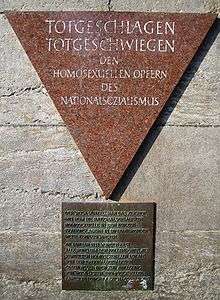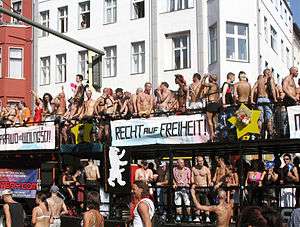LGBT culture in Berlin
Berlin, the capital city of Germany, has an active LGBT community with a long history. Berlin has many gay districts, with the biggest of them, Schöneberg, also being the first in the world.

History
Berlin has a long history of gay culture and influence on popular entertainment, and according to some authors,[1] in the 1920s the city was the Gay Capital of Europe. In 1896 the world's first gay magazine started in Berlin, called Der Eigene ("The Self-Owning"). Magnus Hirschfeld, a German physician, founded the Scientific-Humanitarian Committee in May 1897 as a subset of Berlin's Institute for the Science of Sexuality. Not only was this organization the first of its kind in Germany, it was the first gay-rights organization in the world to lobby for the rights of gay, lesbian, and transgender people, with a focus on legal representation.
During the 1920s and 1930s the world's first gay village was in Berlin's Schöneberg. Gay and lesbian bars and nightclubs flourished, as did queer artistic expression through films, music, and print publications.[2] Cabaret singer Claire Waldoff and actress Marlene Dietrich lived and worked in Berlin's queer neighborhoods during this time. The first gay demonstration ever also started in Berlin in 1922.[3] The Reichstag nearly decriminalized homosexuality in 1929, before the year’s economic crash made a final vote impossible.[4] The rise of fascism in Germany in 1933 put increasingly pressure on Berlin’s homosexual community as officials closed bars such as Eldorado and banned gay publications, forcing Berlin’s homosexual men either underground or into camps.[5]
Homosexuality would only be decriminalized in 1969, which allowed for a much more open expression of gay and lesbian culture. The Homosexuelle Aktion Westberlin (HAW, Gay Action West Berlin) was the first modern gay organization in Germany, founded in 1971. Initially an all-male group, HAW protested many lingering anti-sodomy laws. In 1985, Berlin opened the world's first Gay Museum, otherwise known as the Schwules Museum, "a private institution dedicated to preserving, exhibiting, and discovering gay and lesbian history, art, and culture."[6] Contemporary Berlin actively promotes tourism in gay neighborhoods, including Schöneberg.
 Der Eigene, the world's first gay magazine
Der Eigene, the world's first gay magazine Die freundin, Berlins lesbian magazine, 1928
Die freundin, Berlins lesbian magazine, 1928 Gay club Eldorado, 1932
Gay club Eldorado, 1932 Homosexuelle Aktion in West Berlin, 1971
Homosexuelle Aktion in West Berlin, 1971
Geography
Berlin has many gay districts but Schöneberg is the main gayborhood of Berlin. Other gay districts are Prenzlauer Berg and Kreuzberg. The Memorial to Homosexuals Persecuted Under Nazism is in Tiergarten.
- Memorial to Homosexuals Persecuted Under Nazism
 Gay bear, Nollendorfplatz
Gay bear, Nollendorfplatz Rainbow Column, Nollendorfplatz
Rainbow Column, Nollendorfplatz Memorial "Pink Triangle", metrostation Nollendorfplatz
Memorial "Pink Triangle", metrostation Nollendorfplatz
Economy
LGBT businesses in Berlin include bars, clubs, restaurants, and shops. The most of them are concentrated in Schöneberg, close to Nollendorfplatz.
Media
The lesbian magazine L-MAG[7] and the queer magazines Siegessäule[8] and Blu[9] are based in Berlin. These three magazines are also containing English articles and cover a wide variety of issues relating to gay life in Berlin and Germany, as well as politics and culture.
Institutions
The Schwules Museum is the world's first gay museum and is located in Mitte. The museum is dedicated to the history of the gay rights movement in Germany and gay topics in general, covering more than 200 years of gay history in Germany and Europe. Since 2009, the museum is receiving financial support from the Senate of Berlin, which allowed it to significantly broaden the scope of its exhibitions and scientific research.[10] In partnership with Temple University and Computerspielemuseum (Video Game Museum, Berlin), in 2018-2019 the museum hosted the RAINBOW ARCADE exhibition, which explored the queer history of video games.[11]
Politics

Klaus Wowereit was the Governing Mayor of Berlin from 21 October 2001 until 11 December 2014. Wowereit has come out during the 2001 elections and stated publicly on a party congress that he was gay, with the now famous sentence "I am gay - and that's good the way it is!".[12] Later on, he described it as the most important sentence in his life.[13] After his outing, Wowereit has received a lot of support from fellow party colleagues and the wider public and eventually won the Berlin State Elections of 2001 and remained Governing Mayor of the city for nearly 13 years.
Festivals
Berlin Pride is the gay pride parade in Berlin, the first took place in 1979. Other pride parades in Berlin are Dyke March and Kreuzberg Pride, also known as Transgenialer CSD, which ran from 1998 to 2013. In 2019, two alternative pride events are Libertarian CSD and Radical Queer March.
Other festivals include, Folsom Europe, Easter in Berlin, the Hustlaball and the Yo!Sissy Queer Music Festival.
Notable residents
See also
- LGBT rights in Germany
- Persecution of homosexuals in Nazi Germany and the Holocaust
- Schwules Museum
- Tom's Bar
Notes
- Beachy, Robert (2014). Gay Berlin: birthplace of a modern identity. New York: Vintage Books. ISBN 9780307473134.
- "Between World Wars, Gay Culture Flourished In Berlin". NPR.org. Retrieved 2016-02-22.
- Krauss, Kenneth (2004). The drama of fallen France: reading la comédie sans tickets. Albany: State University of New York. p. 11. ISBN 0-7914-5953-5.
- Ross, Alex (2015-01-26). "Berlin Story". The New Yorker. ISSN 0028-792X. Retrieved 2016-02-22.
- "Persecution of Homosexuals in the Third Reich". www.ushmm.org. Retrieved 2016-02-22.
- McKay, Barry. "Documenting Berlin's Gay History | Culture | DW.COM | 21.06.2004". DW.COM. Retrieved 2016-02-22.
- "L-Mag: Das Magazin fur Lesben".
- "siegessäule - queer Berlin -Home". www.siegessaeule.de. Retrieved 2017-07-01.
- "blu – das schwule Lifestyle-Magazin für Berlin - blu hinnerk gab rik Leo". www.blu.fm (in German). Retrieved 2017-07-01.
- "Museen und Einrichtungen Bildender Kunst". www.berlin.de. Retrieved 5 February 2017.
- "Press Release: RAINBOW ARCADE Katalog Crowdfunding – SMU". Retrieved 2019-07-24.
- ""Ich bin schwul – und das ist auch gut so"". www.tagesspiegel.de (in German). Retrieved 2019-07-24.
Further reading
- Mel Gordon: Voluptuous Panic, The Erotic World of Weimar Berlin, Los Angeles 2000, ISBN 0-922915-58-X
- Manfred Herzer: Liebe und Vernunft der Urninge, Das schwule Berlin vom 18. Jahrhundert bis zum Jahr 1933, in: Berlin von hinten, Berlin 1981, ISBN 3-9800578-0-1, S.7-38
- Ross, Alex. "Berlin Story." The New Yorker. January 26, 2015.
- Hofmann, Sarah. “Berlin is gay, and that's a good thing.” DW. 26 Jun. 2015.
- Rollman, Hans. “Uncovering Queer History in 'Gay Berlin'.” Popmatters. 11 March 2015.
